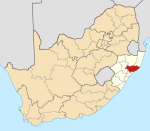Nkandla, KwaZulu-Natal
Nkandla | |
|---|---|
 Road to Mnyakanya High School, Nkandla | |
| Coordinates: 28°37′21″S 31°5′22″E / 28.62250°S 31.08944°E | |
| Country | South Africa |
| Province | KwaZulu-Natal |
| District | King Cetshwayo |
| Municipality | Nkandla |
| Government | |
| • Type | Ward 6 |
| • Councillor | Phumzile Rolca Dlamini |
| Area | |
• Total | 7.00 km2 (2.70 sq mi) |
| Elevation | 1,090 m (3,580 ft) |
| Population (2011)[1] | |
• Total | 3,557 |
| • Density | 510/km2 (1,300/sq mi) |
| Racial makeup (2011) | |
| • Black African | 98.1% |
| • Coloured | 0.4% |
| • Indian/Asian | 0.3% |
| • White | 0.7% |
| • Other | 0.5% |
| First languages (2011) | |
| • Zulu | 92.4% |
| • English | 3.0% |
| • Other | 4.6% |
| Time zone | UTC+2 (SAST) |
| Postal code (street) | 3855 up to 3859 |
| PO box | 3855 |
| Area code | 035 |
Nkandla is a town in the uThungulu district of KwaZulu-Natal, South Africa. It is the seat of the Nkandla Local Municipality, and the district in which the residence of the former President of South Africa, Jacob Zuma, is located. The residence is located 40 kilometres to the south of the town of Nkandla, beyond the Nkandla Forest and on the road to Kranskop.
The Nkandla region encompasses nearly 115,000 inhabitants, spread relatively sparsely over a large area. Nkandla is mainly a rural area and is in the top five of the poorest places in KwaZulu-Natal province.[citation needed] Poverty is prevalent, with 44% unemployment.[2][3] The majority of the population are Zulus.
The Nkandla Local Municipality is a Category B municipality situated within the King Cetshwayo District in the KwaZulu-Natal Province. It is one of the five municipalities that make up the district. Nkandla has a claim to be the ‘cradle' of Zulu history. From Malandela to Shaka, to Dingane and Cetshwayo, Nkandla has been at the centre stage of the Zulu nation's history.[4]
The graves of King Malandela and Cetshwayo and Inkosi Sgananda are at Nkandla. Nkandla Municipality is one of the municipalities in the province of KwaZulu-Natal that prides itself on with rich and opulent history.[4]
The area is located approximately 50 km southwest of UMthonjaneni Local Municipality, 70 km from UMlalazi Local Municipality, and approximately 50 km away from Isandlwana battlefields.[4]
A 2004 documentary, The Orphans of Nkandla, by the BBC and Truevision, recounted the hardships and poverty of orphans in Nkandla. The land is owned by the Ingonyama Trust, which, through Zulu King Misuzulu kaZwelithini, administers KwaZulu-Natal's traditional lands on behalf of the state for the benefit of its occupants. Zuma's property comprises 3.83 hectares.
Zuma was joined by Nelson Mandela to open Mnyakanya High School in 2004.[5]
Geographic location
[edit]References
[edit]- ^ a b c d "Main Place Nkandla". Census 2011.
- ^ "Zuma's guilded battlements besieged". Archived from the original on 22 March 2014.
- ^ "YOU".
- ^ a b c "Nkandla Municipality Intergrated Development Plan 2022-2023/2026-2027" (PDF). Retrieved 12 June 2024.
 This article incorporates text from this source, which is in the public domain.
This article incorporates text from this source, which is in the public domain.
- ^ Mokgola, Thabo (3 March 2004). "South Africa: Zuma, Mandela to open school". South African Government News Agency. Retrieved 11 March 2012.




